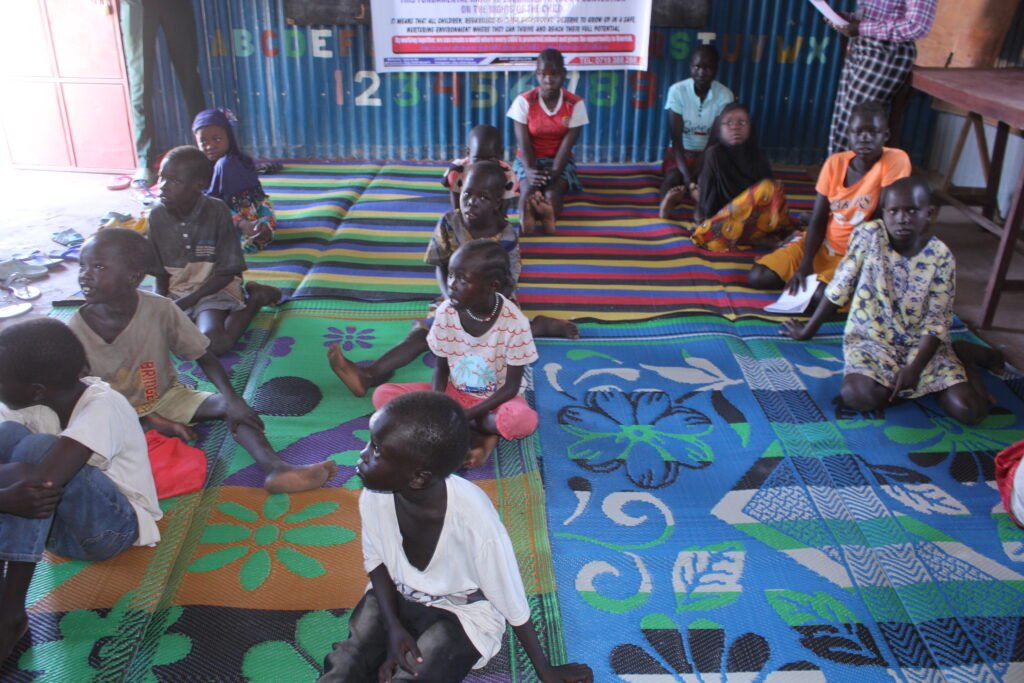SCA Identifying barriers to education through community engagement

Stop Child Abuse (SCA) is making a significant impact on overcoming barriers to education in the Kakuma refugee camp through its Child Friendly Forum (CFF) and collaborations with partners like Humanity & Inclusion. The situation in Kakuma, one of the largest refugee camps in Kenya, is a microcosm of the challenges many displaced children face in accessing education. The barriers are multifaceted, ranging from health issues to socio-economic constraints, safety concerns, and emotional trauma. However, through community engagement, awareness-raising, and direct intervention, SCA is working to break down these obstacles.
1. Identifying Barriers to Education through Community Engagement
The recent Child Friendly Forum (CFF) in Kakuma was designed as a safe space for children and their parents to openly discuss the reasons why children are dropping out of school. By facilitating a participatory dialogue, SCA and its partners like Humanity & Inclusion are able to gain insights directly from the people most affected—the children themselves and their families. This community-centered approach is critical for understanding the real challenges that children in Kakuma face, which might not always be visible in broader statistics or reports.
Some of the barriers identified during the forum include:
- Health-related Issues: One child shared that their father had told them not to go to school because they suffer from epilepsy. This points to a lack of understanding and support for children with health conditions, especially in a refugee setting where medical care and disability services can be limited. For children with chronic illnesses or disabilities, going to school can be a daunting challenge without the necessary accommodations or healthcare support.
- Child Labor and Caregiving Responsibilities: Another girl expressed that she could not go to school because her mother had passed away, and she was responsible for caring for her younger siblings. This is a common scenario in refugee camps where parents are absent due to death, displacement, or detention. Without social safety nets, older children often bear the burden of caregiving, leaving little time or energy for education.
- Emotional and Psychological Impact: One child spoke about how they wished they could go to school like their friends but were unable to, which highlights the emotional toll that not attending school takes on children. The loss of educational opportunities can lead to feelings of isolation, anxiety, and depression, further exacerbating the already fragile mental health situation of children living in a refugee camp.
- Safety Concerns: A parent raised concerns about their child’s safety at school due to ongoing conflicts between different refugee communities. These safety issues are compounded in a camp setting where competition for resources, cultural tensions, and inter-group violence can make schools unsafe for vulnerable children.
2. Creating a Safe and Open Environment for Dialogue
One of the most valuable outcomes of the CFF was the creation of a “fun” and “safe” environment where children felt empowered to speak up about their experiences. The use of interactive activities—such as games, storytelling, and group discussions—helped foster a sense of trust and openness. This is crucial in situations where trauma, fear, and mistrust might otherwise silence children and parents. By providing this space, SCA is ensuring that the voices of marginalized and vulnerable children are heard, which is a key step in finding sustainable solutions to the barriers they face.
3. Practical Solutions to Overcome Barriers
The powerful stories shared during the forum underscore the urgent need for practical interventions to remove the barriers to education that children in Kakuma face. SCA and its partners are focused on implementing several strategies to address these challenges:
- Providing Specialized Support for Children with Disabilities or Health Issues: For children like the one with epilepsy, there is a need for health education, access to medical care, and school accommodations. This might involve training teachers to recognize and support students with special needs, as well as ensuring that schools are physically accessible and that children receive the necessary health care and medications.
- Economic and Social Support for Caregiving Children: For children like the girl caring for her siblings, providing social support through community programs, financial aid, or family assistance services could alleviate some of the burdens. By addressing the root cause of child labor and caregiving, SCA can create an environment where children can attend school without the pressure of having to choose between family responsibilities and education.
- Psychosocial Support and Mental Health Services: Given the emotional and psychological toll that lack of education and displacement takes on children, offering mental health services is essential. This could involve counseling services at schools, community-based psychosocial programs, and peer support networks to help children cope with the emotional stress of living in a refugee camp while also fostering resilience and hope for the future.
- Improving School Safety and Security: For children facing safety concerns due to inter-communal conflict, ensuring that schools are safe and secure is critical. This might involve working with local leaders, peace-building organizations, and camp authorities to create safe school environments. SCA could also advocate for conflict-resolution programs within schools and surrounding communities to reduce tensions and violence, allowing children to focus on learning without fear.
- Advocacy for Inclusive Education Policies: SCA’s work in raising awareness about the importance of inclusive education—where every child, regardless of their background or condition, has access to quality learning opportunities—is crucial. By advocating for the rights of refugee children and pushing for more inclusive education policies at the national and international levels, SCA is helping to ensure that the voices of marginalized children in Kakuma are heard and that resources are directed towards addressing the specific challenges they face.
4. Collaborative Approach for Sustainable Impact
SCA’s partnership with organizations like Humanity & Inclusion plays a crucial role in tackling the barriers to education in Kakuma. Collaboration with local and international actors strengthens the impact of interventions and ensures that resources and expertise are mobilized effectively. Whether it’s through providing infrastructure, training educators, or offering psychosocial services, the joint efforts of multiple stakeholders are helping to create a more supportive and inclusive educational environment for children in Kakuma.
Conclusion
The stories shared by children and parents in the Kakuma refugee camp underscore the depth of the challenges that refugee children face in accessing education. However, they also serve as a powerful reminder of the resilience and determination of these children to pursue their education despite overwhelming obstacles. Through its Child Friendly Forum and collaborative efforts with organizations like Humanity & Inclusion, SCA is not only listening to these voices but also actively working to remove the barriers that prevent children from learning. By addressing health, safety, emotional well-being, and social support, SCA is making significant strides toward ensuring that every child in Kakuma has the opportunity to go to school, learn, and build a better future.



0 Comments